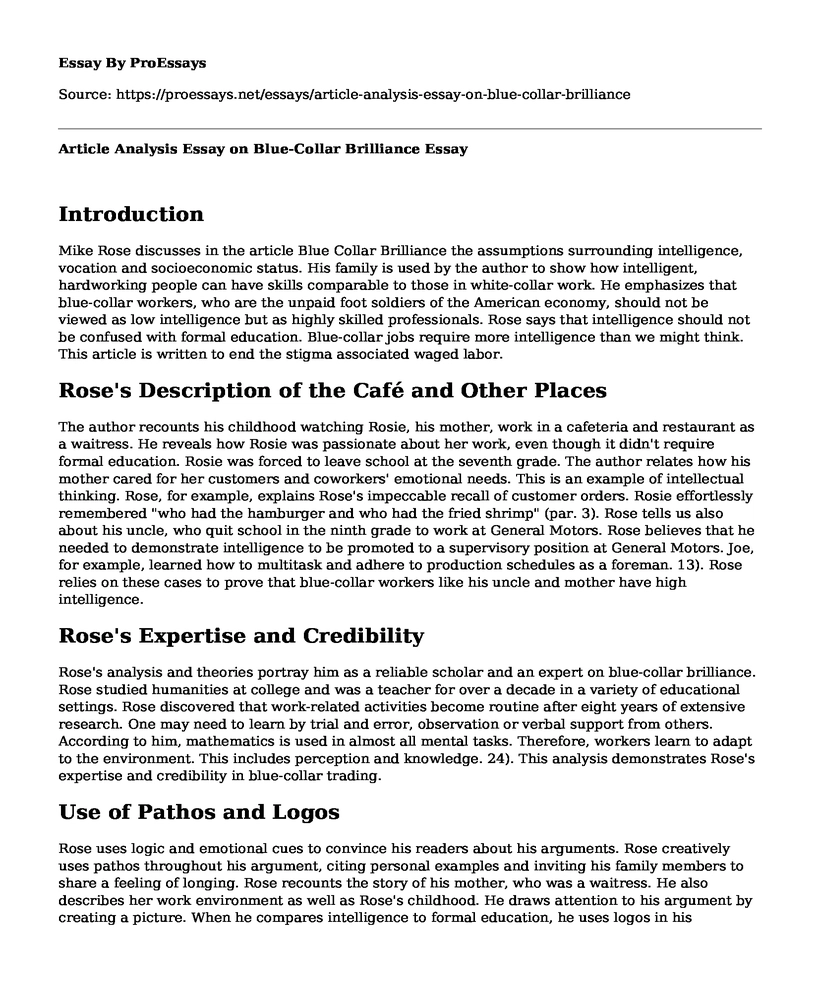Introduction
Mike Rose discusses in the article Blue Collar Brilliance the assumptions surrounding intelligence, vocation and socioeconomic status. His family is used by the author to show how intelligent, hardworking people can have skills comparable to those in white-collar work. He emphasizes that blue-collar workers, who are the unpaid foot soldiers of the American economy, should not be viewed as low intelligence but as highly skilled professionals. Rose says that intelligence should not be confused with formal education. Blue-collar jobs require more intelligence than we might think. This article is written to end the stigma associated waged labor.
Rose's Description of the Café and Other Places
The author recounts his childhood watching Rosie, his mother, work in a cafeteria and restaurant as a waitress. He reveals how Rosie was passionate about her work, even though it didn't require formal education. Rosie was forced to leave school at the seventh grade. The author relates how his mother cared for her customers and coworkers' emotional needs. This is an example of intellectual thinking. Rose, for example, explains Rose's impeccable recall of customer orders. Rosie effortlessly remembered "who had the hamburger and who had the fried shrimp" (par. 3). Rose tells us also about his uncle, who quit school in the ninth grade to work at General Motors. Rose believes that he needed to demonstrate intelligence to be promoted to a supervisory position at General Motors. Joe, for example, learned how to multitask and adhere to production schedules as a foreman. 13). Rose relies on these cases to prove that blue-collar workers like his uncle and mother have high intelligence.
Rose's Expertise and Credibility
Rose's analysis and theories portray him as a reliable scholar and an expert on blue-collar brilliance. Rose studied humanities at college and was a teacher for over a decade in a variety of educational settings. Rose discovered that work-related activities become routine after eight years of extensive research. One may need to learn by trial and error, observation or verbal support from others. According to him, mathematics is used in almost all mental tasks. Therefore, workers learn to adapt to the environment. This includes perception and knowledge. 24). This analysis demonstrates Rose's expertise and credibility in blue-collar trading.
Use of Pathos and Logos
Rose uses logic and emotional cues to convince his readers about his arguments. Rose creatively uses pathos throughout his argument, citing personal examples and inviting his family members to share a feeling of longing. Rose recounts the story of his mother, who was a waitress. He also describes her work environment as well as Rose's childhood. He draws attention to his argument by creating a picture. When he compares intelligence to formal education, he uses logos in his argument (Rose par. 17). He draws the audience's attention to the validity principles through this rational analysis.
Conclusion
Rose's argument is correct. A person's schooling level does not indicate intelligence. Despite the fact that most people are not able to go to university due to economic difficulties, this does mean that they can still earn great titles and get degrees. Higher education, in my view, is valuable, worthwhile, rewarding and essential to success. However, this does not mean that it is always possible. However, college or university is not the only option that will make one's life more successful.
Work Cited
Rose, Mike. "Blue-Collar brilliance: Questioning Assumptions About Intelligence, Work and Other Matters"
Social Class. American Scholar. Web.
Cite this page
Article Analysis Essay on Blue-Collar Brilliance. (2022, Aug 04). Retrieved from https://proessays.net/essays/article-analysis-essay-on-blue-collar-brilliance
If you are the original author of this essay and no longer wish to have it published on the ProEssays website, please click below to request its removal:
- Marriage Therapy Assessment Paper Example
- Negative and Positive Factors That Affect the Well-Being of the LGBTQ Youth Paper Example
- Essay Sample on Segregation and Activism
- Essay Example on Fixed Exchange Rate: Devaluation/Revaluation of Currency
- Calculating Unemployment - Essay Sample
- Essay Sample on East-West Cultural Divides: A Study
- Essay Sample on The Buffalo Crime Family: Pursuing the American Dream Through Deviance







